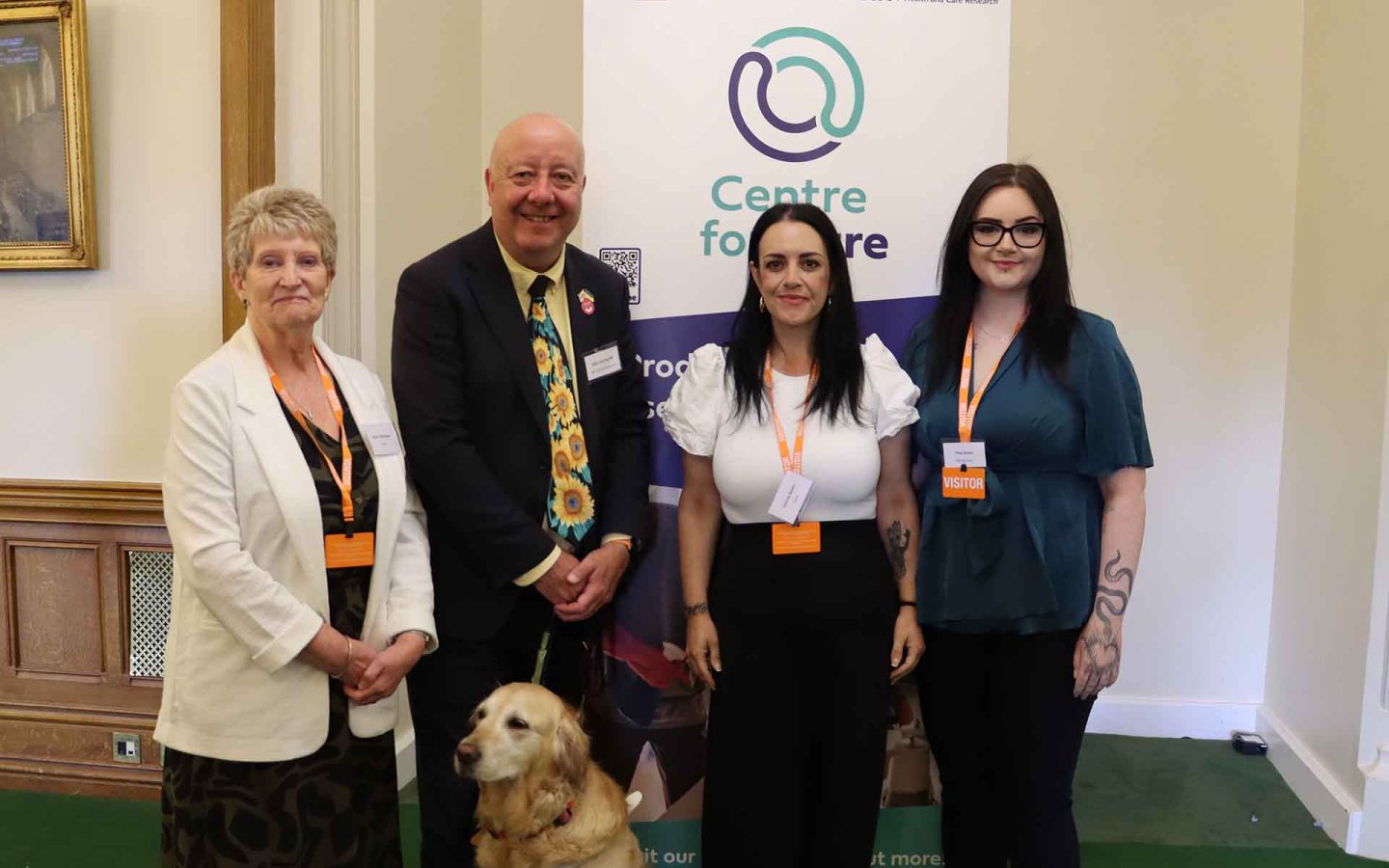In June we were delighted to be joined at our Policy Breakfast event on Carer’s Allowance reform by two unpaid carers, who shared their powerful stories of lived experience with our researchers, parliamentarians, MPs and stakeholders. Their speeches brought compelling context to the event and our research recommendations, and we are pleased to publish them here for Carers Rights Day 2025.
Leanne Green
Hi, my name is Leanne. I am proud to be a carer to my wonderful little boy called Beau. Beau is 12 and has non verbal autism, profound learning difficulties, complex sensory processing disorder, among other issues.
When it was first discovered that Beau likely had autism, We were given a wonderful special needs health visitor who advised me on claiming DLA and Carer’s Allowance. I found the claim process draining and upsetting, having to take regular breaks from detailing all the ways in which my son struggled. I felt like I was reducing him to all the things he couldn’t do. What I really wanted to tell them was that he has a beautiful smile. He loves tickles. He adores his older siblings as they adore him, and he watches Wreck it Ralph to a point where I could confidently recite the entire movie in my sleep. But of course, I understood that it was necessary to talk about the difficulties. The nights where Beau would be up until 3am. The self injurious behaviour. The meltdowns. The incontinence. The constant worry over his diet. His inability to understand danger. And then there are the things that we worry about that we don’t write on the forms. The things we barely want to think about. Who will take care of him when one day I’m unable to? What financial security will he have?
I’m unable to work given that there are 13 weeks school holiday each year, and I’ve no one to take care of him at these times. I’m unable to save as I’m a single parent who pays a fortune in rent every month, and just about makes the benefits we get stretch. My carers allowance goes into my bank account each month, and then I see the very same amount be deducted from my Universal Credit. I’d give anything to have a bit put aside that I could add to. I’d feel so much more secure if I knew that Beau would be well taken care of when I’m no longer able to.
His older siblings have all promised to take care of him, and I know they truly mean that. But I feel useless and helpless that I can’t provide the financial means for them to be able to get some help and assure that Beau has good quality care. I’ll very likely never own a home that can one day be left to my children, on account of the fact I’m unable to work. I can’t overstate the toll this takes on me emotionally, and I’m sure many other carers like me. The fear and insecurity can be overwhelming.
I think I speak for many carers when I say we are tired. Exhausted in fact. Having a child like Beau is in many ways like having a newborn. That sense of being on high alert always. We never switch that off. I have a video monitor next to my bed so I can watch him through the night, hyper aware of any noises and movements he makes. Beau has to sleep downstairs as I’m no longer safely able to get him upstairs. He has no understanding of danger and will try to throw himself down. He’s too tall for me to manage in situations like this, and so I doze restlessly every night, knowing he’s downstairs alone. Some nights I just try to catch a few hours on the sofa. Being constantly exhausted means I often don’t make plans with friends ,as if Beau is with his dad and I’ve the opportunity to catch up on rest, that ends up always being the priority. The time when Beau is in school is spent catching up on housework, trying to find the energy to study, and helping my Dad out who lives nearby and has Parkinson’s.
The school holidays are spent mostly indoors as Beau is too big now for me to manage alone out and about. Any semblance of a sleep routine flies out of the window without school to tire him out, and so the sense of exhaustion and isolation are even more acute.
I wouldn’t change Beau for the world. And caring for him is the greatest privilege of my life. But I do wish we lived in a World that valued unpaid carers. That recognised our isolation. That understood the practical, emotional, and financial implications of being a carer to a loved one.
The days and nights are long. They are lonely at times. Imagine if we could at the very least take away some of the worry by paying our carers in a way that recognises the 24/7 jobs we do. No breaks. No sick days. No holidays. We do it because we love the people we care for. But that love doesn’t pay the bills.
Alison Hattersley
I am in my seventieth year and have been a carer for sixty-three of them, my name is Alison and I live in Sheffield. I found myself a carer for my father who unfortunately became ill when I was eight. This was 1963 and due to a very rare non-cancerous tumour on his spine he had to have a major operation in Derby and was away in hospital for two years. This operation unfortunately was not successful; my brother and I would wave through a window when we visited as we were not allowed in the hospital.
Of course there was no Invalidity Care Allowance for my Mum to claim for as it didn’t start until 1976 and married women were not eligible to claim. She would travel by train to see Dad with a spare 50p in her purse. When Dad came home we had to move house that would accommodate his needs – being a bungalow. Hospital stays continued but at the Lodge Moor Spinal unit in Sheffield. After being married in 1976 my beautiful son came along in 1985, he is my second son after having Ben in 1983.
We knew the day he was born that there were problems – he started having continuous febrile convulsions and that was the start of very frequent stays in hospital. Numerous tests followed but without any conclusion of a condition other than ‘global development delay.’ My career was put on hold as I couldn’t’ sustain working and being at so many appointments and therapy sessions. I didn’t work again for 20 years until Craig left school.
At that time, you couldn’t claim DLA or any other sort of benefit until your child was five years old, so my husband had two jobs because our outgoings were more than we earned. We struggled at times not just financially but emotionally too. Craig is almost forty and has had many ups and downs with his ongoing health issues – not bad to say that we were told he may not live until his first birthday. He still lives with us but requires twenty-four hours nursing care, following a regime for feeding. He is tube fed with bottles of nutrisip feeds, water and medications as he has dysphasia. He also has a stoma and suprapubic catheter to maintain. He is totally dependent on us for all his daily living needs. He is non verbal but we can understand him through facial expressions. When Craig left school and started at a wonderful day service for adults with complex needs I started work again albeit part time at the local Mencap & Gateway charity. I have made many friends there both colleagues and other parent carers which has been a life saver.
Unfortunately, I fell victim to the overpayment scandal of carer’s allowance as on several occasions was paid slightly over the upper earning limit and in total had to repay £2787.00. When you go only 5p over the limit the whole week of carers allowance is taken off you! My employer tried to ring DWP to explain that it was their payment system at fault but to no avail. This has obviously caused more stress and worry on top of caring. I am now of retirement age but still work nine hours per week as I love the work I do. I do not of course get carers allowance anymore as I have a well-earned state pension, this is despite our caring responsibilities getting greater.
My father died twenty years ago – my Mum having cared for him for forty years at home with our input as much as we could. My Mum started with dementia five years ago at the start of the covid lockdown. It was a very difficult time as I was the only member of the family to go in her home and assist her. I would do her washing, cook her meals and assist with personal care. The gradual decline of her cognitive health meant that at the end of 2022 she went into a nursing home. She died a month ago. She had been such a strong supporter of our caring role for Craig despite her own caring responsibilities most of her life.
Two years ago Craig was admitted to hospital with pneumonia and an empyema due to aspiration and we nearly lost him. My husband and I did alternate 24 hour shifts living next to his bed in a reclining chair attending to his needs alongside the medical team for 7 weeks in total and then continuing at home for several more weeks.
Our family has lived constantly caring for one family member or another. Careers have been greatly affected by these life events and certainly has had an impact on our physical and mental wellbeing and our capacity to be in the paid employment we would have pursued.
How long we can sustain this level of care? We don’t know.
After losing respite last year due to the provision closing we were a whole year without breaks. Fortunately Craig has just started with another provider-we get 70 nights a year.
There should be more recognition of carers that dedicate their whole life caring for loved ones.
I conclude in asking for the government to look again at reforming the principle of Carer’s Allowance and its purpose.
Further reading
Read about the Policy Breakfast event where we heard Leanne’s and Alison’s stories here: https://centreforcare.ac.uk/commentary/2025/11/policy-breakfast-carers-allowance-reform/
Read our former Director Professor Sue Yeandle’s commentary on the Carer’s Allowance scandal here: https://centreforcare.ac.uk/commentary/2024/04/carers-allowance-scandal/
Read our Evidence Summary Briefing, The urgent need for a new social contract for unpaid carers’, click here (PDF).




